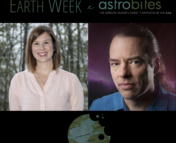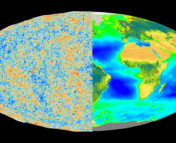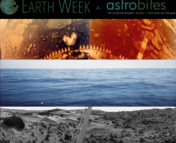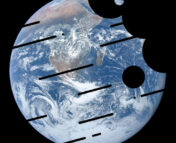Today we see what Dr. David Grinspoon (DG) has to say about his array of experiences (from researcher to working at the Library of Congress, to writing several books) and how they have shaped his career, where he studies other worlds to make sense of our own. This exclusive interview is part of our Earth Week x Astrobites 2022 series. You can find the recap of the event here, the recording of his presentation here (and accompanied closed captioning text), and his biography here.
1) Could you please speak to your background/path and how it led to where you are today? Why are you invested in climate literacy/advocacy? If you were initially following a traditional academic path, could you please emphasize what that turning point was? Could you expand a little bit more about your time as the first Chair of astrobiology at the Library of Congress? What was that like?
DG:
“I wouldn’t describe it as a specific turning point, but I was raised in a family that exposed me to a lot of science and also to political activism: my first political activity was being pushed in a stroller in a “ban the bomb” nuclear disarmament march in Boston when I was 3 years old.
To me climate activism is a continuation of this, arising out of the same kinds of concern about big threats to safety and well-being. When I was an undergraduate I co-founded a student disarmament group and was in a group that occupied a building to pressure our university to divest from apartheid South Africa. When I was in grad school I helped organize a protest at the nuclear test site in Nevada where Carl Sagan, who was one of my mentors, was arrested.
Sagan was the first person I heard talking publicly about the threat of climate change back in the 1980s when I was just starting grad school. I do remember realizing that the skills I was learning to model climate on the primordial Earth and on other planets, were the same kinds of tools people were using to predict climate change on Earth. And I remember when climate change started to be much more of a public phenomena debated in the media, thinking how odd it was that these obscure terms and concepts like “albedo” and “energy balance” which I had studied in grad school were now being discussed in articles in Time Magazine, but also realizing that I had training and knowledge that was applicable to this incredibly important topic.
When I started teaching university courses in astronomy and planetary science, and giving public presentations on these topics, it was natural to make the connections between the way we think about climate on other planets, long-term climate evolution on the Earth, and the changing climate on our planet along with our responsibilities and options. I’ve found that the space exploration angle gives you a different entry point into climate conversations with those who might not be disposed to thinking or acting on climate. When I was at the Library of Congress, studying the connections between astrobiology and human influence on Earth, I found that this perspective came in useful in some discussions with policy-makers. For example, there was one powerful Congressperson who was a climate denier but a huge fan of space exploration. I met with him in his office and we discussed Venus exploration and then kind of backed into a climate conversation. I think it helped.”
2) How do you cope with eco-anxiety/existential dread? It is really easy to feel helpless—how do you overcome that?
DG:
“I had relatives who died in the Holocaust and I grew up during the Cold War when the threat of nuclear annihilation seemed very real. (It still does, but we don’t talk about it as much…)* So I’ve always lived with some level of dread. Even though there are times when climate change and our inept societal response to it does freak me out or make me incredibly sad, there’s also a level of familiarity to the feeling. Something I’ve learned to live with, a deeply unpleasant aspect of life in our times (and maybe there have been equivalent feeling concerns throughout most of human history?)—something that must be balanced with all the joy we find in the world, in the people and other creatures we love, in nature, art, music, learning—all the good stuff that I have in my life.
Somehow I guess I’ve learned to compartmentalize— to hold awareness of the dangerous, bad stuff, and give it some of my attention and energy, while also holding it at bay and letting the immediate experiences I value and positive connections I have sustain me in a way. Sometimes this is easier to say than to enact. Sometimes one needs to take a break and recharge. For me personally, music is really helpful, both playing with other people and enjoying it in general. All of a sudden I’m thinking of a song lyric from Terrapin Station by the Grateful Dead: “Inspiration, move me brightly. Light the song with sense and color. Hold away despair. More than this I will not ask, faced with mysteries dark and vast…”
Also, for some reason, maybe it’s genetic, I’m a constitutional optimist. I can make arguments to tell others why they should be hopeful about the prospects of bending the curve on climate change, and sometimes I even convince myself! I focus on the fact that we are not doomed, just possibly in for a rough century, and that nobody really knows how rough it’s going to be. From studying past predictions of the future, I know that nobody knows the outcome of this century, and that things can change in unforeseen ways.
I sometimes say that if we don’t play our cards right, then the 21st century could be as bad as the 20th century was. Some people respond in disbelief, thinking that the 20th century was great. And it was for some people, but not for others. The hundreds of millions who died from wars, famines, etc., did not have a good 20th century. That’s the scale of damage I see us possibly facing in the coming century. But there are also more hopeful possibilities and some important things bending in the right direction. Necessary but not sufficient.
There’s massive uncertainty [with respect to climate model predictions] and most of the difference between the “worst case” and “best case” scenarios comes down to uncertainties in human action. In other words, we do have the power to bend the curves (see different scenarios and their effects on temperature increase on Earth). And I focus on the fact that surprising progress is being made in some areas—such as the price of alternative energy coming down faster than anyone predicted. When I was at the Library of Congress, I wrote about our evolution on many different timescales: cosmic, geological, biological, cultural, historical, and I saw how as a species we have transcended circumstances and skirted disaster several times before. We almost went extinct 190,000 years ago but survived by reinventing ourselves in ways that I think are relevant today. I believe that humans do learn in the long run, even though far too much of it is by trial and error. I think we’ll learn how to live well as a technological society inhabiting a planet—we’ll do this in part by learning more about how planets work and how we can better integrate our activities into ours. And to do that last part we need to learn a lot more about ourselves.
Looking at history, I know that things always progress in highly nonlinear ways—that nobody can really predict the future, and that things can shift very quickly, including shifts in human consciousness, values and behavior, which is really the kind of shift we need. So, without trying to pull the wool over anyone’s eyes, including my own, I do see room for hope, and also feel a kind of responsibility to focus on the areas where positive action is possible, rather than wallowing in doubt and fear, which don’t help anyone.”
*Author’s note: Please check Astrobites’ statement on the ongoing War in Ukraine.
3) What do you wish that you knew early on when you were just beginning your research career? (General advice for young early career researchers who are thinking of switching paths).
DG:
“My own career has been circuitous, with plenty of setbacks and what seemed like dead-ends. But I managed to find new opportunities when things didn’t work out. It’s more important to follow interests that really excite you than to go for the secure job path, because ultimately that enthusiasm will sustain you. I like the quote from Goethe: ‘Whatever you can do or dream you can, begin it. Boldness has genius, power, and magic in it.‘ For me, finding some good mentors was really crucial. Find your mentors.”
Thank you to Dr. Grinspoon for being part of our first Earth Week series here at Astrobites, and for being part of not one, but two events! He was also part of the third event (our panel on Astro/ teaching us about how we can effectively engage in climate conversations in academic settings!
Contact information:
Dr. David Grinspoon ([email protected], @DrFunkySpoon)
Edited by Ishan Mishra
Featured Image Credit: Headshot – Dr. David Grinspoon; Logo – Suchitra Narayanan
This article was written as a part of our Climate Change Series. We’d love to hear what you would like to see from this initiative – if you have ideas, please let us know in this google form.




